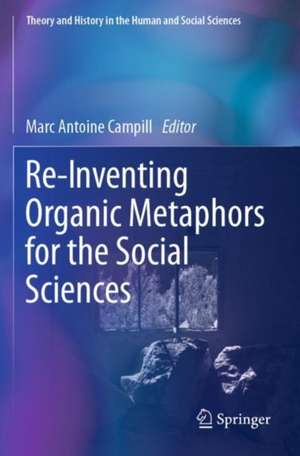Re-Inventing Organic Metaphors for the Social Sciences: Theory and History in the Human and Social Sciences
Editat de Marc Antoine Campillen Limba Engleză Paperback – 27 mai 2023
| Toate formatele și edițiile | Preț | Express |
|---|---|---|
| Paperback (1) | 573.62 lei 38-44 zile | |
| Springer International Publishing – 27 mai 2023 | 573.62 lei 38-44 zile | |
| Hardback (1) | 950.03 lei 6-8 săpt. | |
| Springer International Publishing – 26 apr 2023 | 950.03 lei 6-8 săpt. |
Din seria Theory and History in the Human and Social Sciences
- 15%
 Preț: 646.75 lei
Preț: 646.75 lei - 17%
 Preț: 457.49 lei
Preț: 457.49 lei - 15%
 Preț: 643.99 lei
Preț: 643.99 lei - 15%
 Preț: 645.14 lei
Preț: 645.14 lei - 18%
 Preț: 777.20 lei
Preț: 777.20 lei - 15%
 Preț: 644.95 lei
Preț: 644.95 lei - 15%
 Preț: 641.38 lei
Preț: 641.38 lei - 15%
 Preț: 647.27 lei
Preț: 647.27 lei - 15%
 Preț: 641.38 lei
Preț: 641.38 lei - 15%
 Preț: 581.01 lei
Preț: 581.01 lei - 18%
 Preț: 892.11 lei
Preț: 892.11 lei - 15%
 Preț: 693.06 lei
Preț: 693.06 lei - 15%
 Preț: 697.00 lei
Preț: 697.00 lei - 15%
 Preț: 634.18 lei
Preț: 634.18 lei - 18%
 Preț: 727.97 lei
Preț: 727.97 lei - 18%
 Preț: 894.46 lei
Preț: 894.46 lei - 18%
 Preț: 892.59 lei
Preț: 892.59 lei - 18%
 Preț: 787.29 lei
Preț: 787.29 lei - 18%
 Preț: 904.11 lei
Preț: 904.11 lei - 18%
 Preț: 784.48 lei
Preț: 784.48 lei - 9%
 Preț: 542.55 lei
Preț: 542.55 lei
Preț: 573.62 lei
Preț vechi: 744.95 lei
-23% Nou
Puncte Express: 860
Preț estimativ în valută:
109.76€ • 114.84$ • 91.18£
109.76€ • 114.84$ • 91.18£
Carte tipărită la comandă
Livrare economică 29 martie-04 aprilie
Preluare comenzi: 021 569.72.76
Specificații
ISBN-13: 9783031266799
ISBN-10: 303126679X
Pagini: 263
Ilustrații: XVII, 263 p. 61 illus., 31 illus. in color.
Dimensiuni: 155 x 235 mm
Ediția:2023
Editura: Springer International Publishing
Colecția Springer
Seria Theory and History in the Human and Social Sciences
Locul publicării:Cham, Switzerland
ISBN-10: 303126679X
Pagini: 263
Ilustrații: XVII, 263 p. 61 illus., 31 illus. in color.
Dimensiuni: 155 x 235 mm
Ediția:2023
Editura: Springer International Publishing
Colecția Springer
Seria Theory and History in the Human and Social Sciences
Locul publicării:Cham, Switzerland
Cuprins
1. Prelude: Psychology in metamorphosis.- 2. Time as an organic metaphor.- 3. The regeneration of the space of landscape - where experiencing is fundamentally sustained.- 4. Ohh-- Guovssahas above my meadow: Introducing the Gestalt-explosion as the core factor of meaning-generation.- 5. Everything Is Bound to Transform: On Knowledge’s Flow .- 6. Allegory Analysis:A Methodological Framework For A Tool For Psychology.- 7. The knot and the psyche. A study on the dynamism of the psyche by means of the knotting praxis.- 8. Exploring the “garden metaphor”: An inter-modal autoethnography.- 9. The Role Of Metaphors In Model-Building Within The Sciences Of Meaning.- 10. Ice cream: An exploration of outsiders by parasitological insights.- 11. Biocenosis of the Self: The dynamic of relationships.- 12. The Story of Isepal – A Case Study Allegory Analysis –.- 13. Dialogue: How to use the wasted potential of thoughts and efforts.- 14. Conclusion: Following innovation into the wasteland: Re-inventing organic metaphors.
Notă biografică
Marc Antoine Campill, accomplished his master’s degree (MSc.) in cultural psychology at the Sigmund Freud (Private) University Vienna and his bachelor’s degree in psychology (BSc.) from the University of Luxembourg. The current field interest is determinate toward the cultural psychological understanding of the individuum, in his identification process. As his current publications imply, his interests are set on generating a new psychological perspective by integrating the social construction of common knowledge and the scientifical meaning of other “Naturwissenschaften” into the psychological field. His collaborative work with Japan dedicated to the hihkikomori phenomena serves as the basis for the theoretical efforts made collectively in this volume. The creation of dynamic models, that can surpass the mechanical restrictions of current theoretical models in psychology, is a central aim of his current construct as a researcher.
Textul de pe ultima copertă
The “Re-Inventing Organic Metaphors for the Social Sciences” is a volume with the specific goal: to challenge psychological understandings by connecting psychological approaches with multidimensional perspectives of various other scientific streams, meanwhile imbedding the generated knowledge in metaphors that allows researchers to follow phenomena into a deeper and more (w)holistic understanding of its appearance. This is particularly important when the humankind faces challenges due to systemic biological changes, as the phenomenological dynamics bonded to those challenges can be conserved in appropriated context. For this purpose, the organic metaphors are introduced. A tool that has central advantage over mechanical metaphors as it can capture the complex and open-systemic nature of biological, psychological, and social phenomena. For example—the widely used notion “mind as a computer” may be more productively replaced by “mind as a membrane”—with implications (e.g. focus on borders in-between, or in systems in themselves- exosystemic realities in our world). There are many other fertile opportunities not yet explored in the realms of psychology and other sciences. Furthermore, the contributors operated also as cross-reviewers for each other’s. In this occasion a new dimension, in chapter construction, will be introduced. Beside the traditional reviewing of another paper the reviewer has been asked to add a small list of extending questions toward the reviewed paper. These added questions have been introduced as potential questions that the authors were demanded to add into a final sub-chapter of their contribution. The subchapter has been titled as “Dialogue” (the author was free to select between the questions and ideas on those they believe could inhabit an especially worth for the future readers).
Caracteristici
New elaborations and positions toward central Psychological Phenomena Extending insights by richly illustrated metaphors of organic nature Introduction of a central and new cultural psychological positioning in a dialogue
